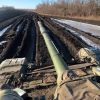Christmas could be turned into a communal outdoor celebration – with hot drinks and mince pies consumed in the street – scientists have suggested, in alternative plans drawn up for safer festivities.
In a set of proposals compiled by Independent Sage – a group formed in response to concerns about a lack of transparency in scientific advice given to government – they say the rules over the festive period will depend upon the rate and level of infections at the time.
“Yet irrespective of the question of whether indoor household mixing is possible or not, we must develop ways of celebrating that keep ourselves, our families and our community safer,” the team write in the document titled Safer Winter Celebrations and Festivities.
With indoor transmission known to be a key factor in the spread of the coronavirus, the scientists offer two main approaches to keeping Christmas safe – meeting up online or outdoors, and reducing risks for home gatherings.
The team say Christmas 2020 could focus on community celebrations – whether online or outdoors – something they say would help those who face having to spend the celebration alone, be they elderly people or millennials. They add that the government should work with local communities and companies to resource and support such endeavours.
Prof Susan Michie, a member of Independent Sage, said that, among the possibilities, people could meet up on kerbsides or in public places, bringing their own drinks and glasses – or cups of tea – as well as festive treats such as mince pies.
“The outside is so much safer than indoors,” she said, adding it is much easier to keep two metres apart when al fresco. “Another [idea] is just going for walks with people,” said Michie, noting other options would be to open up community centres for a safe, distanced community Christmas, or making more spaces pedestrianised over Christmas.
If households are allowed to mix indoors, the team say advice should be given on how to minimise risks, with a particular focus on social distancing, ventilation, and hygiene.
That approach also needs the support of central government and local authorities and community groups they say.
“Initiatives could include a fund to support adequate ventilation (akin to schemes to fund home insulation) and a pandemic fuel allowance (to allow people to open their windows and still keep warm),” the team write, adding that a public information scheme would also be needed on how to make homes safe.
Prof Stephen Reicher, another member of Independent Sage, said it would be rash to give guarantees about what will be possible at Christmas.
“If we are in a position where the infections are high, where the NHS is in danger of being overwhelmed, then to do things that would increase the level of infections still further is a huge problem,” he said.
Reicher added it is important to realise that Christmas might be different this year.
“What does loving your parents mean in a time of pandemic? Well it means not hugging them rather than hugging them, because you don’t want to transmit the infection,” he said.
The proposals come as a growing number of scientists have spoken out about the issue of restrictions during the Christmas period.
Some have warned that, even with extra precautions, infections could rise come January. A “bump” in infections, and later hospitalisations, can be seen in recent data for England, which some experts have suggested could be down to a surge in socialising after plans for a national lockdown were leaked on 30 October.
Prof Paul Hunter of the University of East Anglia said that judging restrictions over Christmas was a difficult balancing act.
“Any relaxation over Christmas will lead to some increases in cases and therefore fatalities,” he said.
But he added that some have raised concerns that if restrictions are not relaxed over Christmas, people might ignore the rules anyway – which might also undermine their compliance with future restrictions – while being able to meet up with others for a few days might boost people’s mental health.























































Свежие комментарии